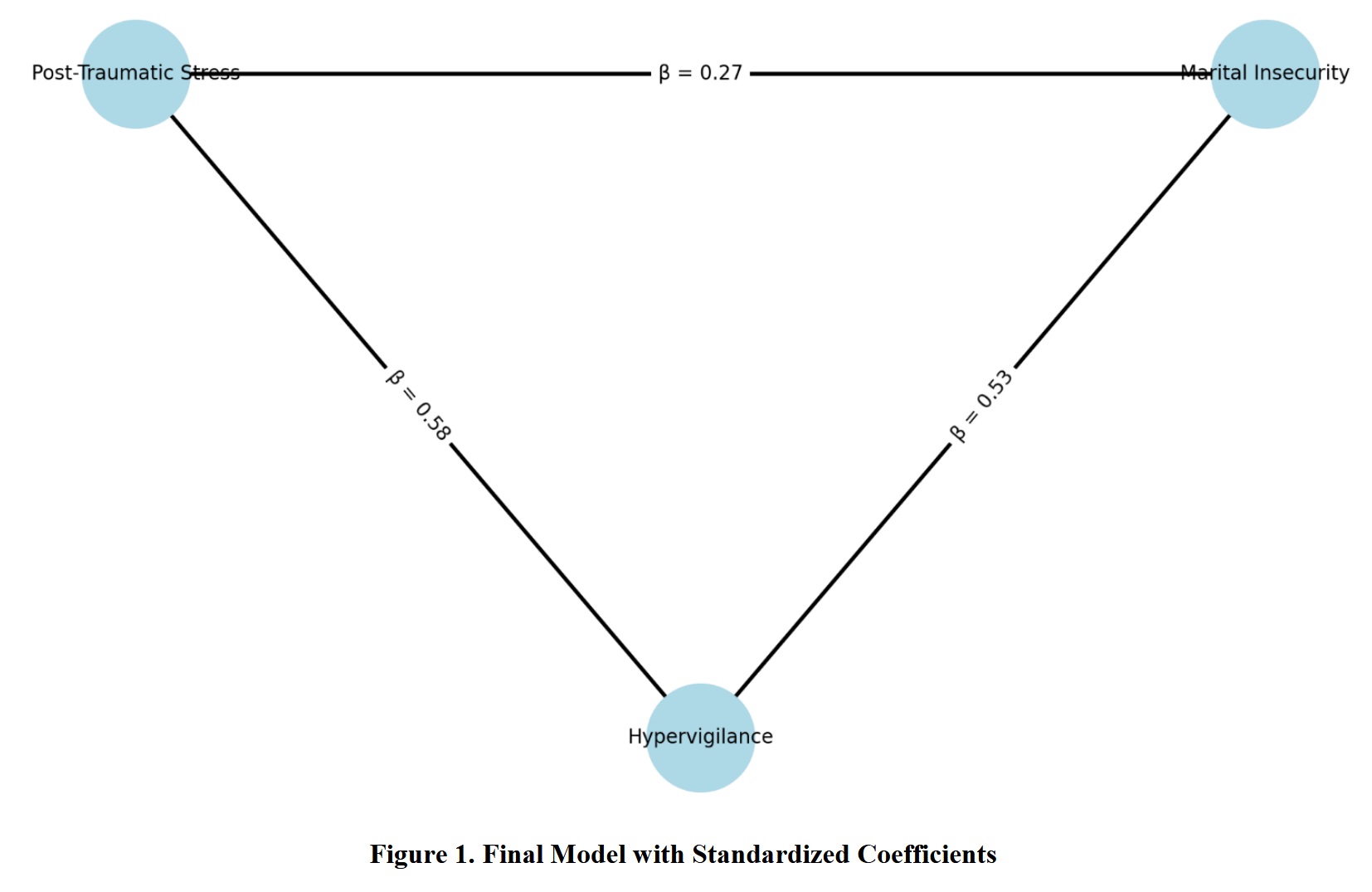The Mediating Role of Hypervigilance in the Relationship between Post-Traumatic Stress and Marital Insecurity
Keywords:
Post-traumatic stress, Hypervigilance, Marital insecurityAbstract
This study aimed to investigate the mediating role of hypervigilance in the relationship between post-traumatic stress and marital insecurity among married adults. A descriptive correlational design was employed with a sample of 409 married individuals from Kenya, selected based on Morgan and Krejcie’s sample size table. Participants completed standardized self-report instruments measuring post-traumatic stress, hypervigilance, and marital insecurity. Data were analyzed using Pearson correlation via SPSS-27 and structural equation modeling (SEM) via AMOS-24 to assess the direct, indirect, and total effects among variables. Model fit indices were calculated to evaluate the adequacy of the hypothesized model. Pearson correlations revealed significant positive associations among post-traumatic stress, hypervigilance, and marital insecurity (p < .001). Structural equation modeling results indicated that post-traumatic stress significantly predicted hypervigilance (β = .58, p < .001), which in turn significantly predicted marital insecurity (β = .53, p < .001). A direct effect of post-traumatic stress on marital insecurity was also observed (β = .27, p < .001), alongside a significant indirect effect via hypervigilance (β = .31, p < .001), supporting partial mediation. The model demonstrated good fit indices (χ²/df = 2.44, CFI = 0.96, TLI = 0.95, RMSEA = 0.058). These findings suggest that hypervigilance serves as a critical psychological mechanism linking post-traumatic stress to marital insecurity. Addressing hypervigilant thought patterns in trauma-exposed individuals may be essential for improving relational stability and emotional security within intimate partnerships.
Downloads
References
Bir, K., Burcu, Ç., Kahraman, B., Mersin, S., & Acun, A. (2022). Relationship of Cognitive Control and Flexibility With Anxiety Among Nursing Students in the Times of COVID-19 Pandemic: A Cross-Sectional Study. 4(4), 324-331. https://doi.org/10.35365/ctjpp.22.4.03
Çankaya, Ö., & Aydoğan, N. (2022). The Relationship Between Argumentation Skills and Cognitive Flexibility of Pre-Service Science Teachers. Asian Journal of Education and Training, 8(2), 51-59. https://doi.org/10.20448/edu.v8i2.3963
Er, Y. O., & Deniz, M. E. (2022). The Mediating Role of Self-Compassion and Cognitive Flexibility in the Relationship Between Differentiation of Self and Subjective Well-Being. Cukurova University Faculty of Education Journal, 51(3), 1642-1680. https://doi.org/10.14812/cuefd.1074927
Gür, T. B. (2023). The Mediating Role of Emotional Dysregulation and Cognitive Flexibility in the Relationship Between Self-Compassion and Forgiveness. Uluslararası İnovatif Eğitim Araştırmacısı, 3(CİLT 3 SAYI 3), 345-372. https://doi.org/10.29228/iedres.70061
Haft, S. L., Kepinska, O., Caballero, J., Carreiras, M., & Hoeft, F. (2019). Attentional Fluctuations, Cognitive Flexibility, and Bilingualism in Kindergarteners. Behavioral Sciences, 9(5), 58. https://doi.org/10.3390/bs9050058
Hayatbini, N., Knauft, K., & Kalia, V. (2021). Cognitive Reappraisal Moderates the Relationship Between Perfectionism and Cognitive Flexibility. Journal of Clinical Psychology, 77(7), 1685-1699. https://doi.org/10.1002/jclp.23124
Howlett, C. A., Wewege, M. A., Berryman, C., Oldach, A., Jennings, E., Moore, E., Karran, E. L., Szeto, K., Pronk, L., Miles, S., & Moseley, G. L. (2022). Back to the Drawing Board—The Relationship Between Self-Report and Neuropsychological Tests of Cognitive Flexibility in Clinical Cohorts: A Systematic Review and Meta-Analysis. Neuropsychology, 36(5), 347-372. https://doi.org/10.1037/neu0000796
Hu, S., Zhong, Z., Zhang, J., & Zheng, X. (2018). Cognitive Flexibility and Advice Network Centrality: The Moderating Role of Self-Monitoring. Frontiers in psychology, 9. https://doi.org/10.3389/fpsyg.2018.01947
Hwan, K., Jin, H., Ha, J. H., & Jue, J. (2021). Examining the Relationships Among Concealment Tendencies, Illness Attitudes, Belief in a Just World, and Cognitive Flexibility. Frontiers in psychology, 12. https://doi.org/10.3389/fpsyg.2021.627739
Jen, C.-H., Chen, W., & Wu, C. W. (2018). Flexible Mindset in the Family: Filial Piety, Cognitive Flexibility, and General Mental Health. Journal of Social and Personal Relationships, 36(6), 1715-1730. https://doi.org/10.1177/0265407518770912
Kaur, J., & Loomba, S. S. (2022). Study of Relationship Between Cognitive Flexibility and Well-Being of School Students. Pijr, 161-163. https://doi.org/10.36106/paripex/4309798
Khodarahimi, S. (2018). Self-Reported Nutritional Status, Executive Functions, and Cognitive Flexibility in Adults. Journal of Mind and Medical Sciences, 5(2), 210-217. https://doi.org/10.22543/7674.52.p210217
Klein, K. P., & Lancaster, S. L. (2017). Reexamining the Association Between Facets of Mindfulness and Cognitive Performance. Journal of Cognitive Enhancement, 1(3), 345-351. https://doi.org/10.1007/s41465-017-0037-0
Li, Y., & Chu, X. (2022). Aggressive Behavior, Boredom, and Protective Factors Among College Students During Closed-Off Management of the COVID-19 Pandemic in China. Frontiers in psychology, 13. https://doi.org/10.3389/fpsyg.2022.1012536
Park, J., & Kim, N. (2021). The Mediating Effect of Cognitive Flexibility on the Relationship. The Journal of Humanities and Social Sciences 21, 12(4), 2407-2422. https://doi.org/10.22143/hss21.12.4.171
Park, S., & Shin, Y. (2022). Is Perfectionism Beneficial or Detrimental to Creativity? Relationships Between Creativity, Regulatory Focus, Cognitive Flexibility, and Creative Performance. Korean Academy of Management, 30(3), 237-263. https://doi.org/10.26856/kjom.2022.30.3.237
SezgİN, E., & GÜRbÜZ, M. D. (2022). Examination of the Relationship Between Cognitive Flexibility Skills and Teaching Motivations of Child Development Students. Kırklareli Üniversitesi Sosyal Bilimler Dergisi, 6(1), 131-156. https://doi.org/10.47140/kusbder.1090343
Tuncer, M., & Tanaş, R. (2022). Bilişsel Esneklik Ve Öz Düzenleme Becerileri Arasındaki İlişki. Afyon Kocatepe Üniversitesi Sosyal Bilimler Dergisi, 24(2), 467-479. https://doi.org/10.32709/akusosbil.903722
TÜYsÜZ, H., Dogan, N., YİĞİT, S., Kaya, U., ŞAhİN, E., & Yilmaz, A. (2023). Examining the Relationship Between Parent-Child Relationship and Parents' Cognitive Flexibility, Emotion Regulation Skills. Social Science Development Journal, 8(38), 87-99. https://doi.org/10.31567/ssd.940
Usluca, M., & GÜLer, K. (2021). Yetişkinlerde Erken Dönem Uyum Bozucu Şemalar Bilişsel Esneklik Ve Bilişsel Duygu Düzenleme Arasındaki İlişkiler. Journal of Social Research and Behavioral Sciences, 7(13), 640-661. https://doi.org/10.52096/jsrbs.6.1.7.13.33
Varangis, E., Qi, W., Stern, Y., & Lee, S. (2021). The Role of Neural Flexibility in Cognitive Aging. https://doi.org/10.1101/2021.04.22.440855
Yu, J., & Lee, T. M. (2016). Cognitive Flexibility and Changes in Hopelessness Across Time: A Moderation Hypothesis. Applied Neuropsychology Adult, 24(5), 404-409. https://doi.org/10.1080/23279095.2016.1155991

Downloads
Published
Submitted
Revised
Accepted
Issue
Section
License

This work is licensed under a Creative Commons Attribution-NonCommercial 4.0 International License.
